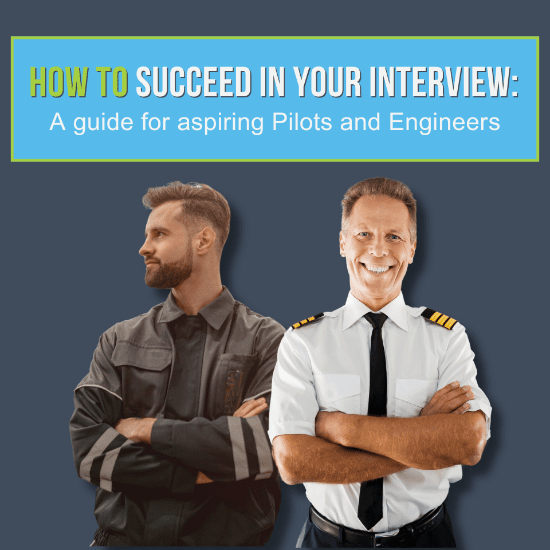How to Succeed in Your Interview: A Guide for Aspiring Pilots and Engineers
- Publish Date: Posted 6 months ago
- Author:by Resource Group
Interviews can feel daunting, intense and nerve-racking. Whether you're a pilot aiming for the cockpit of your dreams or an engineer stepping into a critical tech role, your interview is a crucial step in showing who you are, how you think, and why you should be chosen to join a company’s team.
Let’s break down how you can succeed at your interview as a pilot or engineer - from preparation to interview.
For Pilots: Navigating the Interview Skies
Know the Aircraft - and the Airline
Be ready to speak confidently about your flying experience and aircraft types, including limitations, systems, and emergency procedures. Research the airline and familiarise yourself with:
Aircraft types (engines, passenger configuration, MTOW, VMO, Max Ceiling)
Fleet size
Product (Configuration First / Business / Economy)
Destinations
Bases
History (when was the airline formed)
Key people (CEO, CFO, Director of Flight Operations, Chief Pilot)
Recent company news (e.g. new aircraft or new routes they are operating)
The airline’s biggest competitors
Always think of ways your experience can align with their needs.
Practice Technical and HR Questions
Expect questions that test both your technical aviation knowledge e.g., “What is the maximum take-off weight, landing weight, and ramp weight?” and how you handle real-world scenarios e.g. “Tell us about a time you faced a challenge in the cockpit”. Use clear, structured answers like the STAR method (Situation, Task, Action, Result) to keep your answers structured.
Logbook
Make sure your logbooks are up to date and well-presented. Interviewees want to see not just your flight hours, but consistency, recency, and a professional presentation.
Stay Calm Under Pressure
If a simulator or scenario assessment is part of your process, you should stay calm and communicate effectively. Your decision-making under pressure is just as important as your technical response because interviewers tend to be more interested in how you respond under pressure rather than getting every question correct.
Professional Presence
Dress to impress, speak clearly, sit confidently and professionally present yourself. Even in Zoom interviews your appearance and behaviour still matter. You're not just being evaluated as a pilot - you’re being seen as a potential representative for their brand.
What are you required to bring to an interview?
The majority of the time airlines should tell you what you are required to bring to an interview, however, if they don't, we would advise as a minimum to bring the following:
Flying Licence
Class One Medical Certificate
Logbook
Confirmation of the interview (print the email or take the letter)
Pens and a paper pad
Academic qualification certificates
Airside ID (if applicable)
Flight school final report (if applicable)
Personal, academic and employment references
Application summary including answers to online questions (usually available if you have made an online application)
For Engineers: Building Your Interview Success
Prior to your interview, you will be expected to show all documentation such as an EASA or UKCAA licence and the required certifications needed for the role.
Know Your Tools and Projects
Be ready to explain the projects mentioned on your CV. The company you apply to is interested in your thought process, the challenges you faced, and the solutions you engineered. You will need to know your programming languages, CAD tools, and/or circuit design techniques inside out.
Expect Problem-Solving
You may be asked to work through a technical challenge or case study. Make sure you are clear when discussing your approach and don’t feel as though you can’t ask questions or explain your reasons behind what you have done.
Revisit Fundamentals
Interviewers value a solid understanding of the fundamentals. Revisiting core concepts - whether it's thermodynamics, electrical systems, or algorithms - will ensure you're well-prepared and feel confident during technical discussions.
Teamwork Matters
Many engineering roles require cross-functional collaboration. Be ready to talk about how you worked with teams and contributed to their success, handled conflict, or responded to project failures.
Know the Company
Understand the company’s mission, products, and culture. If you're applying to an aerospace firm, know their aircraft and tech stack. Spend time learning about the company's projects, values, and the industries they serve. Think about how you can contribute to helping them grow.
Final Tips for Both:
Do your research: Understand the company culture and values.
Practice, Practice, Practice… interview questions with friends, family and mentors, or use online platforms.
Be honest in your interview. If you don’t know the answer, that’s okay. Demonstrate how you could find out the answer.
Follow-Up: Always send a thank-you email.
Remember the finer details: Be punctual, polite, and prepared. First impressions go a long way.
End of interview questions
Whether you are attending a pilot or engineer interview, at the end, when the interview draws to a close you will be given the opportunity to ask your questions. Therefore, make sure you have some ready to ask. This will show your interest in the role and company and eagerness to find out more information about what the role entails.
So, are you ready for take-off?
Whether you’re aiming to soar through the skies or you’re ready for your next challenge in engineering, the interview is your launchpad.
You've got this.

CONNECT WITH US